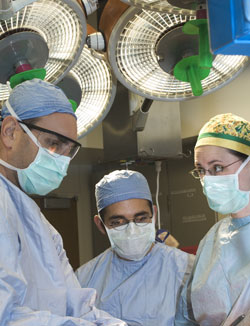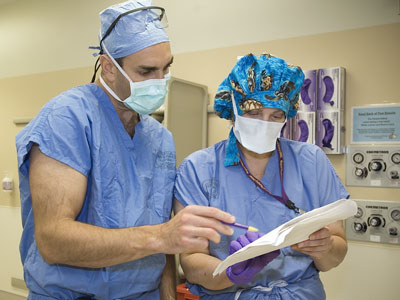Bariatric Surgery: The Debate Continues
A debate is on in the United States over bariatric surgery, an increasingly popular treatment for extreme obesity.
On one hand, the surgery is very effective in helping obese patients lose large amounts of weight. On the other hand, critics say obesity surgery is risky: one in 50 patients undergoing the procedure die within 30 days, and others suffer complications.
 |
| The surgical team headed by Dr. David Flum (left) operate on a patient. |
"Surgeons are right in the middle of this argument," said Dr. David Flum, assistant professor of surgery and a gastrointestinal surgeon at UW Medical Center.
With obesity becoming more prevalent in the United States, surgical treatments such as gastric bypass have experienced a growth in popularity over the past decade.
Nearly two-thirds of Americans are overweight or obese, and weight-related health problems are the second-leading cause of death in the United States.
"Part of the problem is that we have Stone Age genes in a modern environment," said Flum. "We know there's a dramatic imbalance in calories that we take in versus calories burned in activity."
The number of people who are extremely obese is increasing faster than ever. Extreme obesity brings with it a raft of potential medical problems, including diabetes, edema, heart and lung ailments, depression, and others.
"You can't name an organ system that isn't affected by obesity," said Flum.
Most obese patients who lose weight through diet and exercise often gain that weight back sooner or later, Flum explained. About 95 percent of people who lose five percent or more of their body weight gain that weight back within five years.

Dr. Flum (left) meets with another member of the surgical team to discuss a planned gastric bypass.
Obesity surgery is far more effective, and insurance companies and doctors are warming up to it as a treatment. About 120,000 people had obesity surgery in 2002, a tenfold increase from the 12,000 procedures performed in 1992.
"When there's a huge increase in the use of a new technology or procedure, there's potential for an increase of risk," said Flum. "We're trying to improve the quality of care of bariatric surgery, and figure out how the surgery does what it does."
Flum is leading a UW effort to study obesity surgery, as part of a federally funded consortium of five research institutions. Researchers will study the safety of the surgery, its long-term impacts, and the mechanisms of how it causes weight reduction.
How the surgery causes weight loss seems simple enough. Bariatric surgery reduces the size of the stomach, through doctors surgically partitioning the stomach or by attaching an inflatable band around it. Shrinking the stomach limits food intake, and the drastic reduction in calories leads to weight loss.
Gastrointestinal physicians believe other factors could be involved, such as gut peptides like ghrelin and peptin that influence the appetite. Gastric bypass patients, who can eat only very small portions of food at a time, should be eating all the time to get enough calories to match their usual appetite. Instead, those patients typically aren't hungry after the surgery, which suggests the procedure could cause a hormonal change that limits appetite.
"This is an opportunity to figure out how to shut off appetite," said Flum. "What we'd like to find is surgery-in-a-pill, a drug treatment that decreases appetite and accomplishes the same thing as gastric bypass without having to perform the surgery."
Researchers will also examine the relative risks of bariatric surgery. Flum led a previous study of 60,000 obese patients, including 3,000 who had the procedure. In that study, one in 50 patients died within 30 days of the surgery. Compared to obese patients who didn't have the surgery, patients who survived the surgery had better long-term survival. After 15 years, 88.2 percent of patients undergoing surgery were still alive, compared to 83.7 percent of other obese patients.
Researchers hope that further study of bariatric surgery can help surgeons prevent adverse outcomes from the surgery, and reduce the short-term risk of the procedure.
